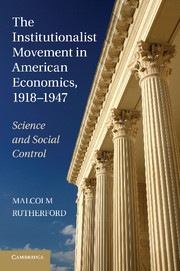Crossref Citations
This Book has been
cited by the following publications. This list is generated based on data provided by Crossref.
Emmett, Ross B.
2011.
Economics and Theology After the Separation.
SSRN Electronic Journal,
Goodwin, Craufurd D.
2012.
Observation Through Fiction: Frank Norris and E. M. Forster.
History of Political Economy,
Vol. 44,
Issue. suppl_1,
p.
206.
Hodgson, Geoffrey M.
2012.
Toward an Evolutionary and Moral Science.
Journal of Economic Issues,
Vol. 46,
Issue. 2,
p.
265.
Kaufman, Bruce E.
2012.
Some Coasian Problems with Posnerian Law and Economics.
Journal of Economic Issues,
Vol. 46,
Issue. 3,
p.
745.
Boettke, Peter J
and
Snow, Nicholas A
2012.
The Servants of Obama's Machinery: F.A. Hayek's The Road to Serfdom Revisited? — A Reply.
Eastern Economic Journal,
Vol. 38,
Issue. 4,
p.
428.
Chasse, J. Dennis
2012.
The Alternate Conception and John R. Commons.
Journal of Economic Issues,
Vol. 46,
Issue. 3,
p.
589.
Maas, Harro
and
Morgan, Mary S.
2012.
Observation and Observing in Economics.
History of Political Economy,
Vol. 44,
Issue. suppl_1,
p.
1.
2012.
The Clash of Economic Ideas.
p.
99.
Fiorito, Luca
2012.
American institutionalism at Chicago: A documentary note.
The European Journal of the History of Economic Thought,
Vol. 19,
Issue. 5,
p.
829.
Whalen, Charles J.
2013.
Core Concepts of Institutionalist Public Finance: Problem Solving, Institutional Analysis, Strategic Choice, and Stakeholder Engagement.
Forum for Social Economics,
Vol. 42,
Issue. 4,
p.
359.
Peterson, Janice
2013.
Economics Education after the Crisis: Pluralism, History, and Institutions.
Journal of Economic Issues,
Vol. 47,
Issue. 2,
p.
401.
Rutherford, Malcolm
2013.
A Research Annual.
Vol. 31,
Issue. ,
p.
61.
Friedman, Gerald
2013.
Global Anti-Unionism.
p.
63.
Rutherford, Malcolm
2013.
A Research Annual.
Vol. 31,
Issue. ,
p.
61.
Nik-Khah, Edward
2013.
The making of the economy: a phenomenology of economic science.
Journal of Economic Methodology,
Vol. 20,
Issue. 1,
p.
86.
Kaufman, Bruce
2013.
The Optimal Level of Market Competition: Neoclassical and New Institutional Conclusions Critiqued and Reformulated.
Journal of Economic Issues,
Vol. 47,
Issue. 3,
p.
639.
Emmett, Ross B.
2013.
Documents related to John Maynard Keynes, institutionalism at Chicago & Frank H. Knight.
Vol. 31,
Issue. ,
p.
117.
2013.
American Labor and Economic Citizenship.
p.
78.
Rutherford, Malcolm
2013.
J.M. Clark and Institutional Economics: Remarks on the Receipt of the Veblen-Commons Award.
Journal of Economic Issues,
Vol. 47,
Issue. 2,
p.
295.
Mata, Tiago
and
Medema, Steven G.
2013.
Cultures of Expertise and the Public Interventions of Economists.
History of Political Economy,
Vol. 45,
Issue. suppl_1,
p.
1.



